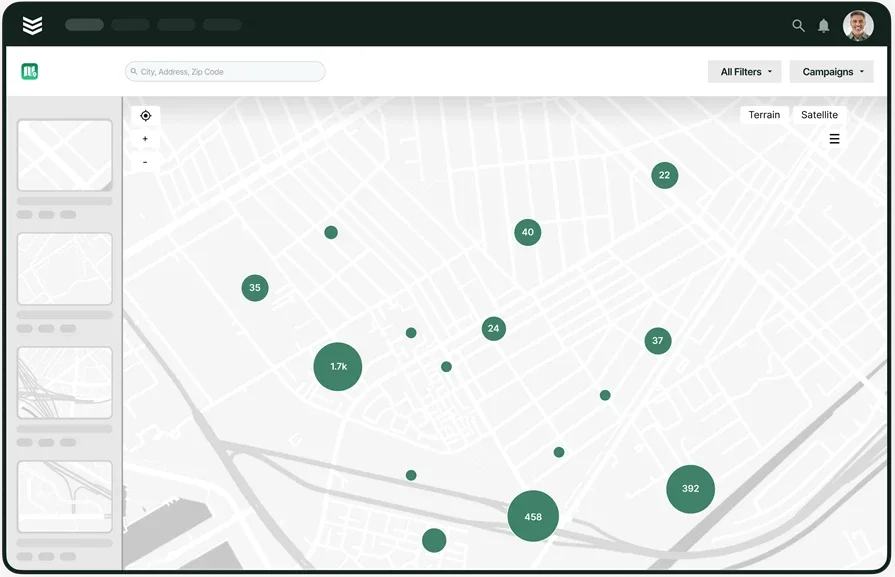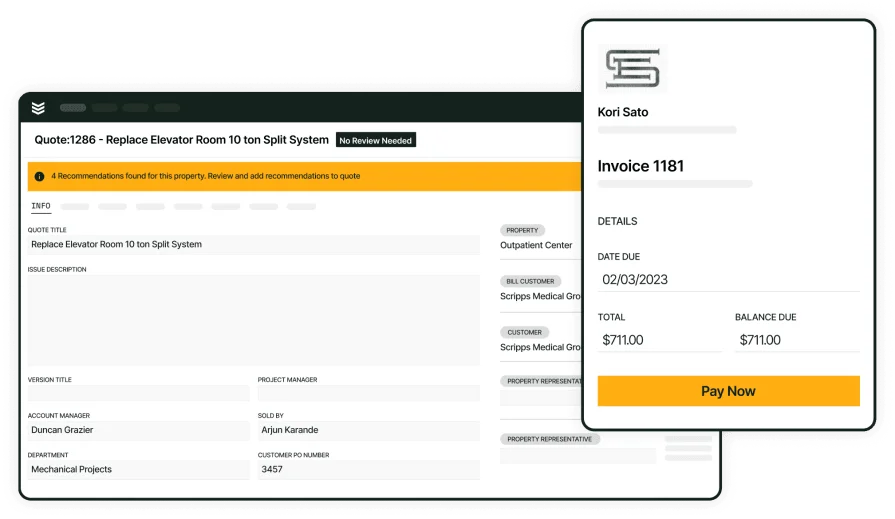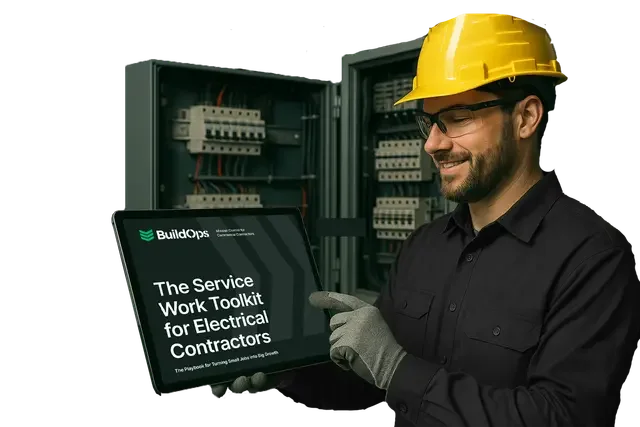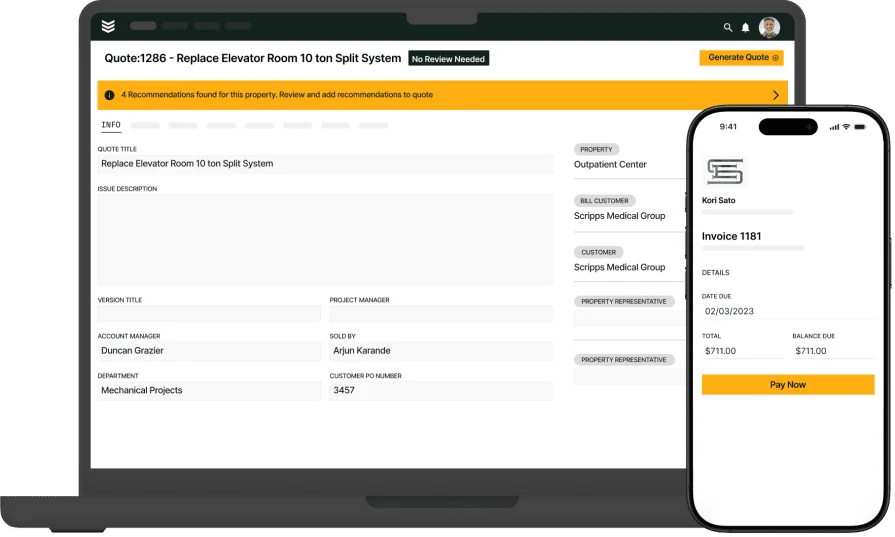Getting estimates out the door faster can be the difference between landing a job or losing it to the shop down the street. For electrical contractors, that pressure’s real. Whether you're bidding on a complex commercial install or a straightforward service upgrade, the tools you use can make or break your margins.
This guide breaks down the top electrical bidding apps that can help you keep pace—without burning out your team. From feature comparisons to types of apps and what actually makes one worth paying for, this is your shortcut to making smart calls with less guesswork.
And if you’re deep in the electrical industry, this isn’t about chasing the latest tech—it's about finding tools that do the heavy lifting so your crew can focus on the job. We’ll cover everything related to electrical bidding apps, including:
- Choosing the right electrical bidding app for your business
- 6 key features to look for in an electrical bidding app
- Types of electrical bidding apps
- 8 best electrical bidding apps for landing jobs
- 7 benefits of using an electrical bidding app
- 4 important FAQs about electrical bidding apps answered
No two electrical businesses bid the same way. Some juggle dozens of open estimates a week. Others are focused on landing a few high-ticket projects a month. Whatever your game, choosing the right app starts with getting clear on how you work, what slows you down, and what kind of support your team actually needs out in the field and back at the office.
Choosing the right electrical bidding app for your business
Before you even download a trial or schedule a demo, slow down and think about what actually matters to your team. Every electrical contractor runs bids differently—some have seasoned estimators, others are training folks on the go. Picking the best electrical bidding app starts with understanding where your current process hits a wall.
Whether you're a growing shop or a large crew managing multiple projects, the goal stays the same: win jobs without wasting hours on paperwork. That starts with asking smart questions.
- Workflow compatibility: Does the app support how your estimators currently build bids—from templates, from scratch, or a combo of both? Can it handle fast takeoffs in the field without needing Wi-Fi?
- Team size & roles: How many people on your crew will actually use this? Do field techs need limited access, or are they part of the estimating process too?
- Type of projects: Are you mainly bidding service calls or full-scale buildouts? Does the app let you break out labor, materials, and subs clearly for each?
- Mobility needs: Will your team be accessing this from laptops in the office, or mobile devices on the jobsite? Can the app sync across devices without delays or data loss?
- Features: Does the tool include item libraries, job costing tools, or real-time markup adjustments? Can it integrate with your existing accounting or project management software?
Once you’ve nailed down what your business actually needs, the next step is breaking down the features that set the best bidding apps apart. Not every app can handle the demands of electrical contracting—so let’s dig into what features matter most when the pressure’s on.
6 key features to look for in an electrical bidding app
When you’re in the electrical trade, time lost equals money lost. A missed detail in a bid, a delay in quoting, or an unclear proposal can stall jobs—or worse, lose them. A solid electrical bidding app doesn’t just sit in the office—it moves with your techs, connects with your quoting process, and gives your estimators a real-time edge whether they’re on-site or on the road. Here are six features you’ll want to see in any electrical bidding app worth your time.
1. Mobile access for on-site bidding
Electrical work doesn’t happen behind a desk—and neither should your bids. A mobile-capable bidding app keeps your estimates accurate, live, and editable from anywhere. Whether it’s walking a jobsite, handling a client call, or reviewing specs in the van, your team needs tools that move with them.
Say you’re doing a walkthrough at a new build where the GC asks to swap in higher-end fixtures and add a backup panel. Instead of taking notes and hoping someone back in the office updates the numbers, your estimator pulls out a tablet, adjusts the quote, and sends it over by the time the meeting wraps. That level of responsiveness is what separates you from the rest, and it’s exactly what you get with a purpose-built technician mobile app for electrical contractors.

Check out our bidding tool
Send flawless project bids that land you more jobs and increase profits.
2. Real-time proposal editing
Field conditions change fast—your bids should too. Real-time proposal editing means your team can modify scope, line items, or pricing without restarting the entire document. It reduces bottlenecks between field and office, and cuts down on costly delays caused by outdated paperwork.
Here’s one for you: An electrical contractor quoting an office retrofit discovers that half the conduit is surface-mounted, not hidden. That small change affects material pricing and install time. With live editing features in a solid electrical bidding app, they tweak the proposal during the job walk, not after—and keep momentum going. For estimating jobs cleanly under pressure, you need proposal editing tools for electrical bidding apps.
3. Pre-built cost and parts libraries
A great bidding system comes loaded with libraries—assemblies, line items, unit pricing, even pre-configured job templates. That way, your crew isn’t starting from zero each time. Whether it’s a panel changeout or full facility rewiring, templates shave off hours and make bids more accurate.
Let’s say your crew is quoting a full breaker panel upgrade with surge protection across multiple units in an apartment complex. Rather than rebuilding line items manually, your estimator selects a saved package for multi-unit panel work, adjusts quantity, and sends it. Done. That kind of repeatable speed only comes from tools built with electrical bidding app libraries baked in, like those in this pipeline management software for electrical contractors.
4. Built-in markup and margin control
Margins matter. You shouldn’t have to guess or use spreadsheets to protect your bottom line. Look for bidding software that lets you build in markups automatically by item, category, or job type—so you're not eating costs without realizing it.
Here’s a scenario: Your estimator quotes a hospital wing build-out and forgets to factor in the custom labor rate for overnight shifts. The base bid looks fine, but without markup logic tied to labor types, you end up underbilling thousands. With the right bidding app for electrical contractors, markup rules help catch that before the quote goes out. See how this kind of visibility works with reporting & analytics tools made for electrical bidding.
5. Seamless integration with scheduling and dispatch
Once a bid is approved, the clock starts ticking. Your bidding app should connect smoothly to scheduling and dispatch tools so jobs can be assigned and slotted without juggling multiple platforms. No double entry. No missed start dates.
Think about quoting a generator install for a commercial property that’s dealing with rolling blackouts. The client approves the bid on-site. Your office gets the green light, but now needs to coordinate trenching, permits, and two separate crews. If your bidding system talks to dispatch, the job gets scheduled before lunch. That’s why smart teams choose dispatch-ready field service software for their electrical contracting jobs.
6. Invoicing-ready structure
An underestimated feature of strong bidding software? Structured estimates that feed directly into invoicing—no rebuilding from scratch. That ensures your final invoice lines up with your original scope, reducing disputes and missed items.
Picture this: You wrap up a panel relocation job and send the invoice. The client pushes back saying they didn’t approve the upsized conduit. But because your original quote—pulled from your electrical bidding app—clearly shows the change order and pricing, there’s no back-and-forth. It’s all documented, clean, and professional. This is what makes tools with invoicing functionality for electrical contractors a non-negotiable feature.
Other valuable bidding app features for electrical contractors
Beyond the core estimating tools, great bidding apps support the rest of the job lifecycle too. These features may not be part of building the bid itself—but they help electricians stay organized, bill accurately, and keep the back office in sync with the field.
- Time tracking: Bidding’s only part of the story. Once the job’s approved, you need to know how long tasks actually take to measure profitability. Time tracking ensures your actual labor costs match your quoted hours—and gives your estimators better data for future bids. Here’s a closer look at time tracking.
- Service agreements: For shops handling long-term clients, service agreements help automate recurring jobs and planned maintenance. Estimators can build bids directly from agreement terms, saving time and locking in consistent work. Learn more about how service agreements can work in your favor.
- Payment solutions: Once the work is done, getting paid shouldn’t drag on. Bidding tools that tie into payment platforms let you invoice from the same place you quoted—speeding up the closeout process and improving cash flow. Read about how integrated payment solutions simplify this.
With these extras supporting your bidding app, your estimates are connected to the rest of your operation. Now let’s look at the types of bidding tools available and how they stack up for different kinds of electrical work. Ready? Let’s break it down.
Types of electrical bidding apps
Bidding tools aren’t all designed the same. Some focus on quick pricing, others are loaded with detailed estimating functions. A few bring your entire workflow together from first quote to final invoice. Choosing the right type comes down to how your team works in the field and what level of control you want over your numbers. Here’s a breakdown of the most common types—and what makes each one different.
Desktop-based bidding software
These are traditional programs installed on office computers. They tend to offer advanced estimating capabilities with deep customization options. This setup works best for estimators who spend most of their time in the office. But once your team is mobile or working from different locations, local-only access quickly becomes a limitation.
Want a deeper look at how today’s bidding tools stack up? This article about electrical contractor bidding software breaks down features, comparisons, and what to watch out for—so you can choose a tool that actually works for how your team runs bids.
Cloud-based bidding apps
These live online and can be accessed from any device with a login. Updates sync automatically, so your field and office teams are always working off the same version. It’s a solid fit for contractors managing estimates across job sites and needing collaborative access without relying on email attachments or flash drives.
Mobile-first estimating apps
Designed for use on smartphones and tablets, these apps make it easier to quote jobs directly in the field. With simplified workflows and offline functionality, they allow techs and foremen to build or update estimates without heading back to the office. This type of app works well for service calls and on-the-go quoting.
All-in-one field service platforms
More than just bidding, these systems connect estimating with dispatching, project management, CRM, and invoicing. They eliminate the need to juggle multiple tools by keeping everything in one place. These platforms are a good match for growing electrical businesses that want tighter control over their operations.
Trade-specific bidding apps
Tailored for electrical work, these apps often come preloaded with labor units, assemblies, and material pricing specific to the trade. They cut out generic guesswork and allow your team to hit the ground running with quotes that reflect real-world installs, not generic templates.
With a clear understanding of which app type fits your workflow, let’s look at the best tools out there—and which ones are actually worth your team’s time.
8 best electrical bidding apps for landing jobs
If you’re still building bids in spreadsheets or toggling between apps to get a quote out the door, there’s a better way. Today’s top electrical bidding apps are built to help you win work faster—with less friction, more accuracy, and features that actually fit the way your team operates in the field. Whether you’re quoting quick-turn service calls or chasing large install contracts, the tool you choose should help you move fast and stay organized from start to sign-off. Here are five top options—and the kind of contractor each one works best for.
1. Best for commercial: BuildOps
When you're handling multi-phase projects, strict timelines, and crews across multiple job sites, you need an app that keeps pace. BuildOps delivers that with a platform tailored for commercial electrical contractors. Estimators can build accurate bids from pre-set templates, adjust pricing on the fly, and pull in labor rates or customer details—all without leaving the field. From first walkthrough to signed approval, everything stays connected through the app.
Pricing details: BuildOps offers customized pricing based on the size and complexity of your business. You’ll need to connect with their team directly for a walkthrough and quote.
Beyond just bidding: This app doesn’t stop once the estimate’s out. It includes built-in tools for dispatching, CRM, reporting, mobile field access, invoicing & payments, and ongoing service tracking. That means once a bid is approved, your team’s already set up for what comes next.
Why it fits commercial contractors: The BuildOps app stands out for companies managing large-scale, multi-site jobs. It bridges the gap between the office and field with tools built for complex coordination, keeping projects moving and teams aligned at every step.

Give BuildOps a Try
Take control of commercial electrical contractor bidding and land more jobs.
2. Best for residential: Housecall Pro
Image Source: Housecall Pro
Housecall Pro is built for residential contractors handling fast-paced service work. It allows techs to build estimates, schedule jobs, and accept payments all from their phones. The app is user-friendly and ideal for businesses that prioritize speed and ease of use. That said, it’s not built for managing large-scale commercial jobs or complex project coordination.
How pricing works: Starts around $59/month for the base plan, with features like quote templates and job bundles included at higher tiers.
Features beyond bidding: Online booking, automated client reminders, built-in marketing, and integrated payment options help smaller teams stay organized without a full back-office staff.
What sets it apart for residential: Tools like quote-to-job conversion and online customer approval make it great for closing jobs quickly, especially during same-day or emergency calls.
3. Best for general contractors: Jobber
Image Source: Jobber
Jobber is a solid choice for contractors who manage a blend of job types—from quick service work to multi-visit installs. Its estimating tools are flexible and easy to use, and the app includes built-in CRM and scheduling. For more complex project tracking or enterprise needs, it may feel a bit limited.
How pricing works: Entry-level plans start at $39/month. Estimating is included in all tiers, but automation and deeper integrations unlock with more advanced plans.
Features beyond bidding: Jobber includes time tracking, batch invoicing, real-time scheduling, and client portals—all designed to streamline operations for contractors juggling multiple projects.
What sets it apart for general contractors: It’s lightweight but covers all the basics well, which is helpful for GCs who need dependable quoting and job tracking in one tool.
4. Best for small businesses: FieldPulse
Image Source: FieldPulse
FieldPulse is aimed at small electrical businesses and owner-operators looking to replace spreadsheets or paper quotes with something faster. It balances pricing and functionality well, and is easy to learn. However, larger companies or those needing deep automation may find it lacking in advanced features.
How pricing works: Prices available upon demo request for advanced automation, integrations, or recurring job features.
Features beyond bidding: Scheduling, mobile dispatch, contact management, and estimate tracking—all accessible from a clean mobile interface.
What sets it apart for small businesses: Its simplicity is the appeal. FieldPulse helps smaller shops move off manual processes without overwhelming them with unnecessary tools.
5. Best for enterprise: Simpro
Image Source: Simpro
Simpro is a robust field service platform built for contractors managing high volumes of complex work. It supports deep estimating workflows, change order tracking, and advanced job costing. While powerful, the app has a steeper learning curve and may be overkill for smaller teams or businesses without dedicated back-office support.
How pricing works: Custom quotes only, based on business size and number of users. Higher cost tiers reflect the depth of features and support available.
Features beyond bidding: Extensive tools for asset tracking, inventory, quoting, project management, and multi-stage workflows. simPRO also includes customizable reports and powerful financial insights.
What sets it apart for enterprise: Built for scale and specialization. If you're managing crews across departments or regions, simPRO helps standardize your bidding process while giving leadership the data needed to make decisions.
6. Best for estimating-focused teams: Trimble Accubid
Trimble Accubid is a powerful solution built specifically for electrical estimating, especially for contractors who focus heavily on preconstruction work. It offers in-depth takeoff tools, extensive material databases, and customizable labor units—ideal for teams that spend significant time preparing competitive bids. However, it’s more estimating-centric than operational, so it doesn’t cover the entire project lifecycle.
How pricing works: Custom pricing based on company size and number of users. Typically requires onboarding and training to get started.
Features beyond bidding: Includes detailed takeoff tools, spec sheet integration, change order tracking, and electrical-specific calculation engines.
What sets it apart: Accubid stands out for its depth in preconstruction workflows. For estimating teams that need complete control over quantities, labor breakdowns, and unit pricing, it delivers at a granular level.
7. Best for teams needing quick onboarding: STACK
Image Source: STACK
STACK is a cloud-based platform that helps contractors quickly build bids from digital plans. It includes electrical-specific takeoff features and is designed for teams that want to get up and running fast without a long implementation timeline. While it covers estimating well, it lacks deeper project management tools found in all-in-one solutions.
How pricing works: Starts at around $2,000 per year for core estimating features. Pricing scales based on users and project volume.
Features beyond bidding: Offers plan management, prebuilt assemblies, quantity takeoff, and integration with construction CRMs and accounting systems.
What sets it apart: STACK is ideal for small to mid-sized contractors that need to quickly produce accurate estimates from plans. It’s particularly useful for contractors transitioning from paper or PDF markup tools to a digital estimating workflow.
8. Best for all-in-one estimating and project tracking: Knowify
Image Source: Knowify
Knowify blends estimating with job costing, progress tracking, and invoicing—making it a smart pick for contractors who want both front-end and back-end job visibility in one platform. It’s user-friendly and fits well for crews that want to track performance from quote to closeout. For high-volume estimating or teams that need advanced takeoff tools, it may feel a bit lightweight.
How pricing works: Plans start at $186/month, with features scaling up based on company size and number of active projects.
Features beyond bidding: Includes budgeting, real-time job costing, client communications, and integrations with QuickBooks.
What sets it apart: Knowify’s strength is in connecting estimates to active job tracking and financial reporting, making it a good fit for contractors who want a full picture of profitability—not just quote speed.
Deep Dive
Not sure which one of these tools is the best fit for your electrical bidding process? Check out how these other tools stack up when their features are compared side-by-side with BuildOps:
7 benefits of using an electrical bidding app
Quoting electrical work isn’t always straightforward. Between juggling job sites, changing specs, and keeping track of parts and labor, estimating often takes a backseat—or eats up hours that could’ve gone into actual work. A strong electrical bidding app helps cut through that mess. It supports your team in ways that go beyond just creating estimates—it helps you win jobs, stay consistent, and keep your operation tight. Here are seven ways it delivers real impact.
1. Faster quote delivery
Getting a quote out quickly can be the difference between landing a job or getting ghosted. With a bidding app, estimators and techs can create proposals directly in the field. No delays, no bouncing between systems. Quotes go out fast—and follow-up happens while the job is still fresh in the client’s mind. If you want a tighter loop between your bids and billing, explore how this estimate and invoice app supports electrical contractors from start to finish.
2. Consistent pricing and margin protection
Manual quotes often come with small errors that add up—missed line items, outdated pricing, or uneven markups. A bidding app locks in standard pricing across your team and adds controls to prevent undercharging. That protects your profit without slowing things down, and helps every quote reflect the actual value of your work.
3. Smoother scheduling handoffs
Once a quote’s approved, you need that job on the schedule—fast. A solid bidding app connects directly to your scheduling system, so estimates turn into booked work without manual re-entry. That keeps projects moving and reduces the chance of missed handoffs. To see how top teams bridge estimating and scheduling, check out this electrical contractor scheduling app.
4. Cleaner, more professional proposals
Clients notice the details. With an app, every proposal you send is clean, consistent, and branded the way you want. It’s easier to present line items clearly, include optional upgrades, and avoid confusion that leads to scope creep later. It’s not just about looking good—it’s about making approvals smoother and change orders less likely.
5. Easier material tracking and inventory planning
When material costs jump or certain items run low, your bids need to reflect that in real-time. Apps that sync with inventory help estimators see what’s available and adjust quotes accordingly. That avoids quoting based on guesswork and keeps the team aligned with what's actually on hand. For contractors who want tighter inventory visibility during estimating, learning about electrical inventory management is a solid place to start.
6. More accurate forecasting and reporting
Over time, a good bidding app gives you insight into how your jobs perform. It tracks win rates, average margins, and time-to-approval—so you can spot patterns, improve accuracy, and build stronger strategies. That data helps owners and estimators make better calls instead of relying on gut feel.
7. Less time chasing paperwork
Bidding apps reduce the clutter. No more printing, scanning, or hunting for past estimates. Everything lives in one place—searchable, trackable, and connected to your workflow.

Improve electrical operations
Beat the competition and land more jobs with an effective bidding app.
4 important FAQs about electrical bidding apps answered
Choosing a bidding app means sorting through a lot of options and even more sales talk. If you're still deciding whether to make the switch—or just want to understand what you're actually getting into—these are the questions that come up most from contractors in the field.
1. What is an electrical bidding app?
Electrical bidding apps are a digital tool that helps contractors create and manage job quotes, bids, and estimates—often from a phone, tablet, or desktop. It typically includes pricing libraries, markup tools, and proposal templates designed for quoting labor, materials, and different services.
Many of these apps also connect to other parts of your business, like scheduling or invoicing. Some are simple calculators, while others offer fully integrated platforms that cover the entire project flow—from quote to payment.
2. How do electrical bidding apps work?
Bidding apps help contractors build estimates by pulling in preset pricing for materials, labor, and services. Instead of calculating costs manually, estimators select items from a database, apply markups, and generate proposals that can be sent to customers instantly. Some apps work offline, others are cloud-based, and the more advanced ones sync directly with your schedule, inventory, or CRM. This allows you to keep all job info in one place and reduce time spent switching between systems.
3. Is the cost of an electrical bidding app worth it for electrical contractors?
For most electrical contractors, yes—especially if you're quoting multiple jobs a week or managing crews across job sites. What you spend on the tool is often saved in time, fewer mistakes, faster approvals, and stronger margins. Manual quoting may not cost anything upfront, but the risk of underbidding, missing labor costs, or losing track of materials adds up. A good app pays for itself by helping you win more jobs while protecting your bottom line.
4. What are some best practices to follow when implementing an electrical bidding app?
Even the best tool won’t make a difference if your crew doesn’t know how to use it—or worse, avoids it altogether. That’s why rolling out a bidding app takes more than just handing out logins. Whether you're a one-truck outfit or managing a growing team, the way you set things up can make or break adoption.
Below are key steps that help ensure your electrical bidding app becomes a reliable part of your process—not just another unused icon on someone’s phone:
- Start with a pilot rollout: Let one estimator or crew test it out on live jobs before scaling up
- Customize the system early: Preload your own labor rates, materials, and markup standards—don’t rely on default settings
- Train through real jobs: Use actual upcoming bids during training so your team learns by doing
- Create job-specific templates: Save time with reusable setups for common scopes like panel upgrades, tenant fit-outs, or lighting retrofits
- Set mobile expectations: Make it clear that quotes can be built and sent from the field—not just the office
- Integrate with your workflow: Connect the app with tools your team already uses (like scheduling, CRM, or invoicing platforms)
- Assign a rollout lead: Have someone on the team be the go-to for questions, issues, or updates during the first 30–60 days
- Track usage early: Pay attention to who’s using the app, how often, and where they’re getting stuck
- Keep it lean: Don’t overload the team with every feature on day one. Start with the essentials and build from there
- Ask for field feedback: Your crew knows what works and what’s clunky—let them shape how the tool fits into your process
With the right setup, your bidding app won’t just help you estimate faster—it’ll become the foundation for how you win and manage jobs across the board.
Electrical contractors don’t have time to waste on tools that only handle part of the job. A strong bidding app does more than generate quotes—it helps your team stay aligned, protects your margins, and keeps projects moving from the first walkthrough to the final invoice. The features covered in this guide—like mobile estimating, connected workflows, and real-time pricing—can make a real difference when you’re running multiple projects and deadlines are tight.
Many platforms out there specialize in one piece of the process. BuildOps takes a different approach, combining estimating, scheduling, service tracking, and field coordination into a single platform. That level of connection gives commercial contractors the control and visibility they need without switching between systems.

See if it fits your workflow
Don’t just win more bids, manage projects efficiently through to completion.








